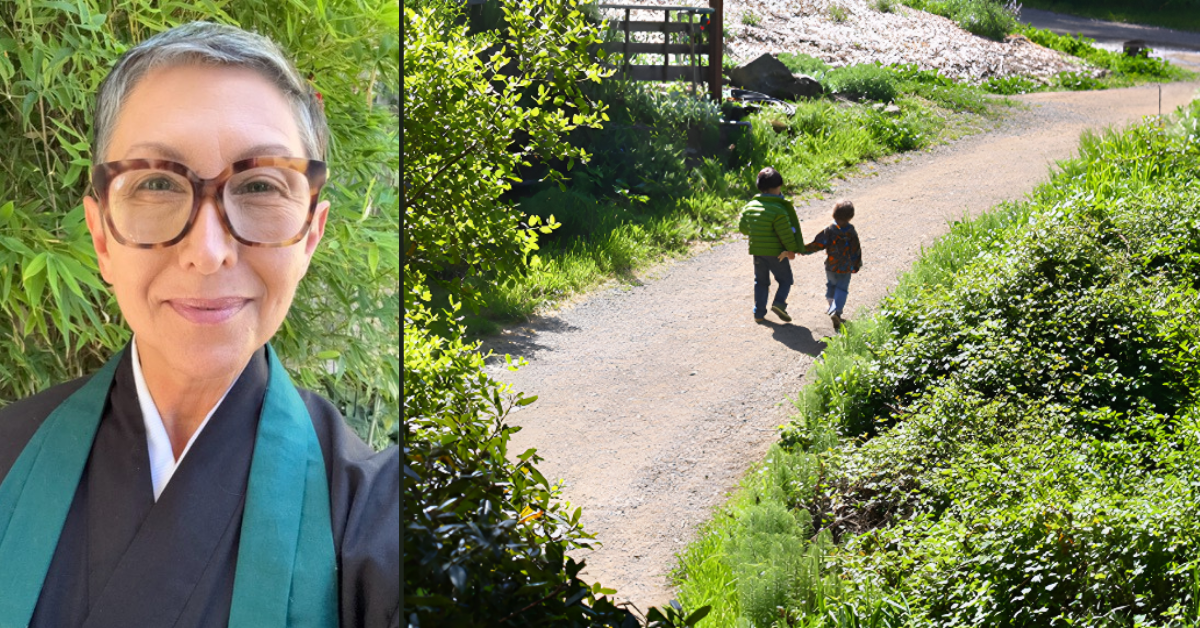
I found my way to Green Gulch Farm through becoming a parent two decades ago. Here, my daughter and I discovered that apple trees and compost piles also give Dharma talks. In this place, between rows of lavender and lettuces, we received the balm of practicing Zen as a family.
Arriving before dawn to earthy smells of wood fires and oatmeal, our participation in the Green Gulch Children’s Program began shaping our lives. Our understanding of the Dharma grew through experiences like planting The Three Sisters (pumpkins, beans, and squash) in a garden tended by children over several decades. My daughter’s hands touched rich soil, receiving the wisdom of the land—and of the Indigenous peoples who developed this living expression of interdependent co-arising, where each plant supports the growth of the other.
Embodied moments like these helped us weave Zen practice into the daily fabric of our lives, where, as Thich Nhat Hanh reminded us, going to the zendo is not the only way of looking after the Buddha. Then, with the death of my newborn son, Julien Honor (whose name means ‘to remember the luminous sky of our true nature’), I discovered the practice of signlessness.
Less well known than the practice of lovingkindness, but arguably related and equal in measure, signlessness teaches us to see with eyes unclouded by preconceptions. Simply put, a “sign” is something like you or me. It’s a cloud, a person, or an owl manifesting temporarily from a beginningless stream of causes and conditions. Where lovingkindness cultivates an unconditional love, signlessness cultivates a perception beyond form and emptiness.
In time, the practice of signlessness revealed Julien’s eyes in the wide eyes of every child. To express this understanding, I began offering support to the Children’s Program as a volunteer. Around the time I received Lay Initiation, I was invited into leadership—and for nearly twenty years now, family practice has remained an expression of my Bodhisattva vows
Over time, the program’s focus evolved from caring for children to supporting the entire family system—honoring our female Buddhist ancestors by bringing forth the embodied lay practice that has existed in our homes, and in our often invisible physical and emotional labor, for centuries. This shift mirrored my personal path, where the twin practices of lovingkindness and signlessness expanded my view of what a family—and what Zen practice—can look like.
Re-envisioned as the Youth & Family Program, we created a curriculum of rituals, art, and imagination, inviting whole families into attunement with seasonal rhythms—and with one another. Following the footprints laid by the previous stewards of our program, we worked to cultivate our relationship with the land and honor the wisdom of children, often with many generations present together.
Exploring practice with beloved Zen stories and koans, we listened with fox ears, roared like lions, and felt ourselves disappearing into frog song and cherry blossoms. We valued family practice as a mechanism for social change, where the family, in all of its myriad forms, is a location of liberation. Through all of this, I received the gift of watching my daughter, Amelie Marie (whose name means ‘to find what you love and give your whole heart to it’), growing up in the Dharma.
Working to increase access to our programs through community partnerships, we invited diverse groups of student-teachers from all around the San Francisco Bay Area to help create a rich holding for our families. Month by month, we co-created a space where people came forward with gift-bestowing hands. With this collaborative, land-and-family approach, our program grew larger than our capacity to serve, often with more than one hundred people attending on any given Sunday.
When the COVID lockdowns started, we responded by moving the program online. With the murder of George Floyd, we felt a responsibility to support families as they sought ways to have difficult and developmentally appropriate conversations about racism and injustice. A new program emerged. Engaged Family Practice ran for two years, addressing the urgent topics of systemic racism and climate crisis, and inviting families into the practice of signlessness—where all children, as James Baldwin encourages, become our children.
We’re back on the land now, renewed as The SFZC Family Sangha, supporting more intimate connections between families. We’re offering a growing ecosystem of practice spaces, including seasonal daylongs at Green Gulch Farm, autumn rituals for ancestors, retreats at Tassajara, and collaborative offerings with the Jizo Ceremonies for children and those who have died. Our newest offering, The SFZC Family Sangha Online is set to begin in January 2026, strengthening our connection as a sangha, opening doors for people who aren’t able to join us in person, and providing a dedicated space where parents and caregivers can receive the nourishment required for family practice.
Earlier this year, I received lay entrustment from my teacher, Hoka Chris Fortin, who taught me a warm and embodied Zen. With my daughter now away at college, I am looking forward to supporting Zen students on their path and am dedicated to building spaces for this inclusive, family Zen. I’m imagining connecting people in their local regions, building mycelial networks of family sanghas, and supporting lay practice beyond our temple walls.
What else is ahead? The SFZC Family Sangha is currently developing offerings that support lifespans, meeting families at each milestone, from pregnancy, to child loss, to raising children and teens, to reframing the empty in “empty nest” as we reorient to our lives without children at home.
As we illuminate the path of family practice, we vow with boundless hearts to care for all children as our children. We vow to wake up—for and with all beings—right within our ordinary lives. With the twin practices of signlessness and lovingkindness, we warmly embrace a soft and embodied family Zen, suffusing love over the entire world, above, below, and all around, without limit.
For more information about the SFZC Family Sangha and a list of upcoming offerings, please see this web page.
Meikyo Chelsea True (she/they) is a lay-entrusted teacher in the Soto Zen lineage of Suzuki Roshi and the guiding teacher for the SFZC Family Sangha. Meikyo first encountered Zen as a child and began meditating at the age of sixteen before completing an undergraduate degree in Religious Studies. She first came to Green Gulch Farm nearly twenty years ago with her daughter, Amelie, and has supported family practice at SFZC ever since.
She holds a master’s degree in Integral Counseling Psychology, works as an adjunct professor at California Institute of Integral Studies, and brings Buddhist Psychology into practice as a licensed psychotherapist with the nonprofit Joyful Mind Project, which she founded.
Meikyo served as shuso (head monk) with her sangha in 2018, allowing her to begin teaching. In 2025, Meikyo received lay entrustment from Hoka Chris Fortin, authorizing her as a lay teacher in the Soto Zen Lineage of Suzuki Roshi and allowing her to begin supporting Zen students. Meikyo is dedicated to widening the path of family practice through a soft and embodied Zen.











